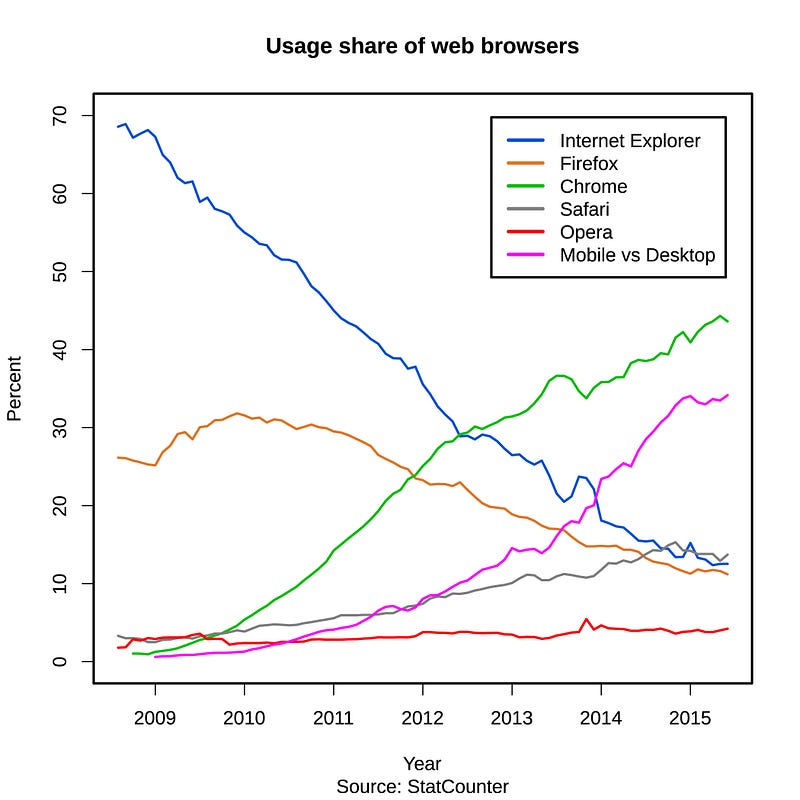Large companies dominating the industry may think we're crazy; we think what we're doing is just right.
Let's start by getting the obvious out of the way; building a self-governed P2P marketplace is a complete paradigm shift. Today, shopping online requires three or more entities to be involved just to complete a sale. That's crazy! The market leaders have been perfecting customer retention, personalized recommendations and last minute deals for over two decades now. Online shopping has become so refined that buyers and sellers hardly even talk unless a problem arises, but at what cost?
Predicting what customers would like to buy isn't just a lucky guess; it's largely based on their personal shopping and browsing history. Customer metadata is collected, harvested and applied to algorithms built to maximize the bottom line. It may seem pretty cool and handy from the outside but the truth is that it is a trust-based system in which the customer usually has no choice but to accept in order to shop online. This trust extends all the way to each company's infrastructure (servers) and their ability to protect your personal data from bad actors. One could argue, "Doesn't this turn Me into the product?"
So why reinvent an entire industry that has perfected a good, logical and profit-generating business model that appears to have the customers' best interest in mind? Simple! Choice. At this time, every eCommerce platform is essentially the same. There is at least 1 payment processor who needs to be involved, collect data and charge a fee. Depending on the platform, there is at least 1 more company involved with listing the item, collecting data and charging a fee. Anytime you are not in control of your personal data and/or money, you run a huge risk of that information being manipulated, misused or hacked by a third-party. The latter can lead to embarrassing or precarious situations, for example the huge Ashley Madison leak.
Particl has a place in this industry and the time for us is now!
What is Particl?
This is a hard question to answer at first take.
"Hey, look everyone, here's a startup now taking on many Goliaths." Amazon and eBay have 20+ years head start on the team and multiple-times over many more resources. This is a battle every startup faces and history has shown that the public responds well when what you're doing is the right way to do it.
Market Analytics
The best companies in the eCommerce sector have gotten to the top through stellar market analytics. However, these are only valuable to centralized companies. Strong market analytics are necessary to continually grow revenue and profits. Particl is a decentralized platform that barely collects fees to list or transact. We'll never be a bloated company with outrageous executive payrolls or lucrative stock options. The team is lean and focused on research and development in an open source environment. All fees generated on the platform are automatically redirected to the community of people keeping the network secure by running nodes and staking.
Product Recommendations
Another aspect of market analytics linked to customer retention is personalized recommendations. These added "features" rely 100% on user metadata. On Particl there is absolutely no way to collect user metadata for recommendations since everything is encrypted. Only the buyer and seller know that a transaction has ever taken place. On the public ledger, it reads like any other generic transaction. Anything from both the buyer and seller's data, the purchase history, the terms of a sale, and more are encrypted and private. We take metadata leakage very seriously, which adds a level of complexity to this project that traditional eCommerce platforms don't have to deal with.
Particl's overall competitiveness to mainstream marketplaces will take time and that's okay. Not only are we providing tools that give people a choice in an otherwise black and white 20+ year old industry, but we are also extending a helping hand to those who never did have such a choice.
Particl does offer benefits even the biggest industry leaders can't offer at this time and that is a positive way to start our journey. On top of working in an open source environment the project also offers:
- passive income for users operating nodes and helping to secure the network.
- zero-to-low fees
- freedom to list almost anything
- ownership of the platform through self-governance
- private listings
- 2 party trustless (MAD) escrow — whitepaper
- end-to-end encrypted communication
Why not build Particl on Ethereum?
This is a valid question and one that would be more applicable if we were building Particl from scratch. The MVP prototype was built on Bitcoin code along with upgrades and innovations from the Shadowcash code. The Bitcoin codebase isn't causing any issue or roadblock to the development of the platform and our upgrade to the latest bitcoin codebase is only going to enhance the performance and security of Particl, as well as add a bunch of new features. I appreciate Ryan X Charles' point of view when discussing jumping ship versus solving problems. While the protocol may be more advanced than Bitcoin, moving to Ethereum would produce additional problems to solve and slow the progress on bringing the Particl platform to market. For example: Ethereum still runs on a PoW consensus algorithm while Particl runs on PoS consensus, which is a value added feature to our network ownership, governance and reward structure.
Video Particl




